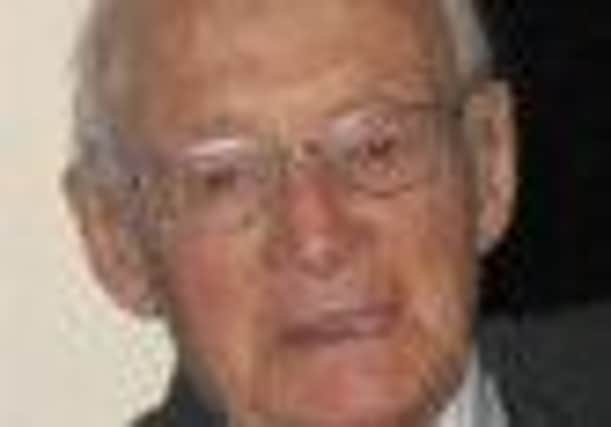Obituary: Rev Alestair Bennett TD MA, minister and merchant seaman


Alestair Bennett was a 21-year-old merchant seaman who had already seen the world when he decided to become a minister.
It was 1930 and, having been everywhere from Vancouver to Vladivostok and Sydney, he was working as a crewman on the Denholm Line steamer Grangepark, shipping coal from South Wales to Las Palmas and Rio de Janeiro.
Advertisement
Hide AdAdvertisement
Hide AdBut the Great Depression was beginning to taking hold, with many ships being laid up, and before he made his third voyage on the vessel he resolved to follow in his father’s footsteps. A son of the manse, born in the front bedroom of the United Free Church minister’s house in Tighnabruaich, he decided to train for the Church of Scotland ministry and was accepted by the University of Glasgow.
It proved a prudent move: returning to Britain from Bermuda in 1931, his ship was laid up and that autumn he embarked on the path that would see him become Scotland’s unofficial Father of the Church, a minister ordained for 74 years.
Born George Alestair Alison Bennett, son of George Bennett from Keith and Helen Alison from Kirkcaldy, his unusual Gaelic spelling of Alestair was suggested by the local registrar. Schooled at Tighnabruaich, East Wemyss – where musician Jimmy Shand was in the class above him – and Buckhaven in Fife, he finished his education at Greenock Academy after his father became minister of the town’s Martyrs’ and North Church.
In the summer of 1925 he joined Alfred Holt & Co’s Blue Funnel Line as a midshipman, starting his indentures on £6 a year, and intending to become an officer in the Merchant Marine Service. He spent four years with the company, travelling all over the world, before leaving to seek more responsibility and faster promotion with Denholms of Greenock.
He became a second mate but within a year had made his decision to leave the merchant navy. By the time he returned from his final voyage his father was minister of Shandon on the Gare Loch and young Bennett secured a summer job as a secretary guide at Ardenconnel House, Rhu, before going to Glasgow University in October 1931.
He graduated MA in 1934, and was an assistant to a minister in Yoker before studying divinity at Trinity College, Glasgow, working as a full-time assistant in South Shawlands Church during his last year of studies.
He was ordained into the ministry of the Church of Scotland in 1938 at his first parish at Newarthill in what is now North Lanarkshire. He had already met his future wife, Helen, a hospital almoner, at a Student Christian Movement conference – known, he said, as the Society for Courtship and Marriage – and they married in Edinburgh in 1939.
The following year they had a son Robin and six months later Rev Bennett volunteered as an army chaplain and was attached to the Black Watch. In 1941 he was posted to 5th Gold Coast Regiment, The Royal West African Frontier Force, stationed in Tamale, Ghana. They guarded the frontier against any potential invasion by the Vichy French before training in India and going on to the Burmese jungle.
Advertisement
Hide AdAdvertisement
Hide AdHe eventually returned to India, camping north of Madras for several months while awaiting demobilisation, and ended his war as senior chaplain of the West African Division. Finally returning home in early 1946, he met his young daughter, Helen, for the first time. Twins girls followed in 1947. In 1948 he was called to Woodlands Church in Glasgow’s west end where he spent ten years in “another strenuous and satisfying ministry”. He remained a chaplain in the Territorial Army and, while living near Glasgow University, became convener of its General Council’s business committee.
From Glasgow he moved to Kilmacolm Old Kirk in Renfrewshire where, in the 1960s, he was investigated for heresy after preaching a sermon voicing the suggestion that Easter could be explained by Jesus rising after three days because he was in a coma and not dead. The claim against him came to nothing.
A few years later, in the journal British Weekly, he courted controversy again questioning the doctrine of the virgin birth and noting that his father, a minister for 50 years, had not believed in it.
Rev Bennett, whose views included support for voluntary euthanasia, was called to Strathkinness Church near St Andrews, in 1968. He remained there until retiring, at 67, in 1976 and he and his wife continued to live in the village for many years.
When he celebrated his 100th birthday in 2009 he was still remembered with affection by his flock – his cards included one from his Bible class at Woodlands where he had preached half a century earlier.
Rev Bennett, who only gave up driving aged 101, moved to a care home in Cupar in 2010. In 2011 he became the unofficial Father of the Church as the Kirk’s longest ordained minister but once acknowledged: “There is no secret to long life, it’s just chance and coincidence… there’s no question of merit.”
Widowed in 1997 and predeceased by their daughter Kay in 1980, he is survived by his son Robin, daughters Helen and Anna, nine grandchildren and 18 great-grandchildren.
ALISON SHAW